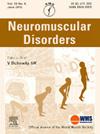探讨成人脊髓性肌萎缩症患者的睡眠质量、抑郁症状和生活质量
IF 2.7
4区 医学
Q2 CLINICAL NEUROLOGY
引用次数: 0
摘要
脊髓性肌萎缩症(SMA)是一种由存活运动神经元1 (SMN1)基因突变引起的遗传性神经肌肉疾病。睡眠障碍及其对SMA患者心理健康和生活质量的影响正在研究中,大多数证据来自儿童SMA患者。我们对成年SMA患者进行了横断面调查。参与者通过匹兹堡睡眠质量指数(PSQI)、患者健康问卷-9 (PHQ-9)和简短健康调查36 (SF-36)对睡眠质量进行问卷调查。50名SMA患者参加了这项研究:66%是女性,中位年龄41岁。其中60%的人睡眠质量差,72%的人有抑郁症状。SMA 2患者PSQI和PHQ-9评分高于SMA 3患者(8±3 vs 6±1,p <;0.001和13±5 vs 7±5,p <;0.001)。PSQI总分与PHQ-9呈正相关(r = 0.32, p = 0.02),有呼吸道症状的患者PSQI总分较高。睡眠不足与成人SMA患者的抑郁症状和呼吸功能障碍有关。临床医生应考虑睡眠质量的SMA患者的最佳护理;需要进一步的研究来更好地了解这方面。本文章由计算机程序翻译,如有差异,请以英文原文为准。
Exploring sleep quality, depressive symptoms, and quality of life in adults with spinal muscular atrophy
Spinal Muscular Atrophy (SMA) is a genetic neuromuscular disorder caused by the mutation of the survival motor neuron 1 (SMN1) gene. Sleep disturbances and their impact on mental health and quality of life in patients with SMA are being understudied, and most of the evidence comes from pediatric SMA patients. We conducted a cross-sectional survey of adult patients with SMA. The participants underwent questionnaires exploring sleep quality with the Pittsburgh Sleep Quality Index (PSQI), depressive symptoms with the Patient Health Questionnaire-9 (PHQ-9), and quality of life with the Short-Form Health Survey 36 (SF-36). Fifty patients with SMA were enrolled in the study: 66 % were females with a median age of 41 years. Of them, 60 % had poor sleep quality, and 72 % had depressive symptoms. SMA 2 patients showed higher PSQI and PHQ-9 scores than SMA 3 patients (8 ± 3 vs 6 ± 1, p < 0.001 and 13±5 vs 7 ± 5, p < 0.001). PSQI total score correlated with the PHQ-9 (r = 0.32, p = 0.02), which was higher in patients with respiratory symptoms. Poor sleep is associated with depressive symptoms and respiratory dysfunction in adult SMA patients. Clinicians should consider sleep quality in SMA patients for optimal care; future studies are needed to understand this aspect better.
求助全文
通过发布文献求助,成功后即可免费获取论文全文。
去求助
来源期刊

Neuromuscular Disorders
医学-临床神经学
CiteScore
4.60
自引率
3.60%
发文量
543
审稿时长
53 days
期刊介绍:
This international, multidisciplinary journal covers all aspects of neuromuscular disorders in childhood and adult life (including the muscular dystrophies, spinal muscular atrophies, hereditary neuropathies, congenital myopathies, myasthenias, myotonic syndromes, metabolic myopathies and inflammatory myopathies).
The Editors welcome original articles from all areas of the field:
• Clinical aspects, such as new clinical entities, case studies of interest, treatment, management and rehabilitation (including biomechanics, orthotic design and surgery).
• Basic scientific studies of relevance to the clinical syndromes, including advances in the fields of molecular biology and genetics.
• Studies of animal models relevant to the human diseases.
The journal is aimed at a wide range of clinicians, pathologists, associated paramedical professionals and clinical and basic scientists with an interest in the study of neuromuscular disorders.
 求助内容:
求助内容: 应助结果提醒方式:
应助结果提醒方式:


